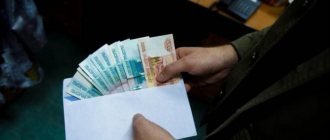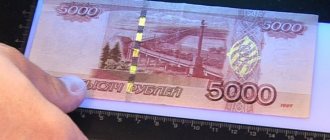Updated: January 1, 2022
Blocking a salary card is a fairly common occurrence in the practice of bailiffs. But by law, imposing a burden on the entire amount of earned funds has always been considered an unlawful act. Then what are the FSSP employees guided by when blocking the card to which the salary is received? What to do if the plastic card has already been seized by them? Why did this happen and how to avoid such trouble in the future? The answers to these questions are in today's material.
In what cases can an account be blocked and how?
Seizure of the debtor's property is a measure of forced execution of the claimant's demands (Clause 5, Part 3, Article 68 of the Law “On Enforcement Proceedings” dated October 2, 2007 No. 229-FZ).
Note! The direct collection of funds from an account should be distinguished from the seizure of property, since these measures have completely different goals.
Thus, the purpose of seizing a bank account by bailiffs is to force the official to comply with the legal request. If execution is not carried out, then the amount that the debtor could not dispose of after blocking may be collected from the account.
The right to implement the procedure is reserved for bailiffs, clause 7, part 1, art. 64 of Law 229-FZ. A ban on spending transactions is a completely justified measure, for example, in cases where the debtor does not have a regular income and does not pay off the debt voluntarily.
Seizure of accounts by bailiffs is carried out on the basis of a resolution, which is sent to the bank where the debtor has an account. If a blocking was carried out, in accordance with Part 4 of Art. 70 of Law 229-FZ, the bailiff indicates in the resolution how it can be removed.
IMPORTANT! Bailiffs do not have the right to seize the credit and loan accounts of the debtor.
How to prevent such troubles
Bailiffs are given the right to send requests to banks about the availability of accounts in your name. If they receive a positive response, the account is blocked. For some reason, banks do not always indicate that the account is a “salary” account. Therefore, you should not wait for extreme measures and repay the debt in a timely manner, and provide the bailiff with information about the work in advance. Anyone can contact the bank with a request to defer payment.
To enforce a court decision, bailiffs can send the employer a writ of execution to transfer a certain amount to the account of the claimant. In this case, the card is not blocked.
If you do not have a bank account, a bailiff may come to your home and seize your movable property.
Of course, it is better to avoid such situations, pay debts on time and do everything according to the law.
Which accounts and incoming funds cannot be seized?
Law 229-FZ (Part 3 of Article 69) directly states which accounts cannot be seized by bailiffs:
- Nominal. Its owner is one citizen, and the actual owner of the funds received by him (the beneficiary) is another. For the debts of the owner, the account cannot be arrested under any circumstances; for the debts of the beneficiary - only by court decision (Clause 2 of Article 860.5 of the Civil Code of the Russian Federation).
- Collateral, where the debtor’s funds were deposited to secure any of his obligations.
- Clearing, since it stores money that will be used to secure obligations admitted to clearing.
- Trade.
This rule provides an answer to another popular question: can bailiffs seize a brokerage account. Yes, since it is not included by the legislator in the above list as an exception.
As for the collection of funds in the account, we should not forget about the list approved by Part 1 of Art. 101 of Law 229-FZ. It contains a list of those incomes that cannot be recovered. These include some types of pensions, compensation payments from the budget, from the employer or social insurance.
Bailiffs do not check the purpose of money received in accounts, so blocking is possible in practice, and to cancel it you will have to contact the SSP.
Reasons for arrest
A salary card may be seized for several reasons:
- debt has accumulated on payments for utility services;
- alimony is paid incorrectly;
- there are several unpaid fines;
- there is a loan debt in one or more banks.
The blocking can be carried out by the Federal Tax Service, customs or a judicial authority. They can not only seize the account, but “drive” it into a negative balance - there will be a minus on the card. You will not be able to withdraw money from your account. You can only deposit them, which, of course, should not be done until the situation with the bailiffs is cleared up.
How to unblock
In case of blocking of funds on the account that are included in the above list, it is necessary to take prompt measures to cancel the decision of the bailiffs. Money can be written off quickly and without additional notification to the account owner.
It is necessary to immediately contact the official conducting the proceedings and inform him that the arrest was made illegally. After this, the bailiff will most likely ask you to come to a personal appointment and bring supporting documents or send them to him in another way (by email, regular mail, fax).
If an official establishes circumstances that prevent the application of an interim measure, he must decide to cancel the decision. If this does not happen, you will have to appeal the actions of the bailiff (out of court or in court).
ATTENTION! The bank cannot independently remove the seizure of funds in the current account even if you bring all the receipts for payment of the debt. To lift the arrest, you need to apply to the court to cancel the interim measures. Based on the court ruling, the bank must remove the seizure from the account.
How to withdraw salary from a blocked card
The bailiff will send requests to banks that cooperate with the debtor or employer. According to the law, up to 50% of the amount received is written off from wages. To receive the remaining amount, our useful tips will help:
- Open a new WORLD map.
- Open an account in another bank that the FSSP does not know about.
- Receive part of your salary in cash through the company cash desk.
The first and second options may be regarded as concealment on the part of the debtor. The bailiffs will know if the defaulter opens a new card in his name.
Taking up to 50% of your salary in cash is a legal way.
FAQ
Will the money be written off immediately or after blocking?
It could be either way. The bailiff has the right to seize, or can immediately write off the entire amount and send it to the applicant. Consequences of arrest: freezing the amount until funds are received in the account and the required amount is written off.
How long will the block last?
It all depends on the amount of money stored on the card. If there is enough money to pay off the entire debt, the bailiff will write off the amount without encumbrances. The citizen will be able to freely use the card. If the amount in the account is not enough, the card is blocked. The arrest will last until the debt is fully repaid and the claimant's demands are satisfied. The debt and enforcement fee in the amount of 7% of the debt amount will be written off from the account, but not less than 1,000 rubles for an individual, 10,000 rubles for a legal entity.
What to do if the card where the pension, alimony, or loan is paid is frozen?
The money is first written off against the debt under the writ of execution, and then to repay the loan. For alimony, you must provide evidence to the ROSP. This procedure is established by No. 229-FZ. The only way out for the debtor is to deposit into the account an amount sufficient to pay off the obligations.
Why does the bailiff block the card without the right to repay the debt in other ways?
The first stage of the bailiff’s work after the decision is made is the collection of funds from bank accounts. This procedure is prescribed in the Federal Law. First, money is collected - cash and non-cash, and then property, shares in business and other assets. It’s easier to write off the money from the account and transfer it to the creditor. When manipulating property, the collection period increases. You need to: put things up for auction, find a buyer, get funds. If the property costs more than 30,000 rubles, only an appraiser can estimate the real value. It's easier with a bank card. The debtor has the right to tell the bailiff about the preferred procedure for collecting the debt. For example, writing off debts from a Tinkoff card. But the decision will remain with the bailiff. You can avoid seizure by transferring funds to the creditor’s bank account and submitting a payment order to the bailiff.
How do you know that the bailiff will write off money from your account?
The procedure for collection under a writ of execution is strict. The bailiff must warn the debtor about the collection. Arrest without warning is considered a violation of the official's authority. A resolution is issued for this purpose. A copy of the document is sent by mail to the debtor and the bank. This is a citizen notification. However, sometimes a letter to the debtor may arrive after the bank has fulfilled the FSSP’s instructions. As a result, the money is written off without notice. Basically, debtors learn about collection: - via SMS about the write-off of money; - according to the changed account balance; — if it is impossible to complete a banking transaction due to account blocking or insufficient balance on the Alfa card or another bank.
Can they collect money without a Decree?
Yes. This is possible when the claimant submits a writ of execution to the bank himself, bypassing the appeal to the FSSP. This procedure is established by Art. 8 No. 229-FZ.
Payment of a bank loan in case of account seizure
When concluding a bank loan agreement, the account from which periodic payments are debited is indicated. If there is enforcement proceedings, such an account may be seized, which makes it impossible to repay current payments. Some credit organizations refer to the impossibility of rectifying the situation and refer them to bailiffs to solve the problem.
While the issue is being resolved in the BSC or not resolved at all, the bank charges interest and applies penalties for late payment. At the same time, the bailiff is not at all obliged to cancel the blocking in such circumstances, although you can try to resolve this issue. In particular, you can pay the debt or part of it voluntarily, disclose in a written statement the sources of income that may be subject to foreclosure, etc.
However, there is a norm - clause 1 of Art. 313 of the Civil Code, which obliges the creditor to accept the fulfillment of an obligation from a third party, if one is assigned to him by the debtor.
Here are simple steps on how to pay a loan if the account is seized by bailiffs:
- Reach an agreement with a third party to repay the loan through him. In some cases, it will be required that he be a card holder of the same bank.
- Ensure that a trusted person has the required amount, sometimes in cash, but more often on a card.
- Write an application from a third party to write off funds from his card to repay the next payment under the loan agreement in a certain amount.
- It may be necessary to write an application from the borrower himself.
Features of debt collection from a salary card
Salary bank cards are debit or credit cards on which employees receive wages. Such cards are issued as part of the salary project. In addition, employees have the right to receive salaries on card accounts of any Russian bank, not limited only by the terms of the salary project.
In terms of functional features, salary cards are no different from other products. If several months of wages are stored on the card, then the specified restrictions of 50% or 70% do not apply, since they only apply to the last periodic payment. Example:
- The employer transfers 50 thousand rubles per month to the employee in the form of wages.
- Every month, the employee spends half of the salary, and the rest remains on the card.
Thus, the balance of the salary card may amount to, for example, 200 thousand rubles. This money can be recovered in full within the framework of enforcement proceedings, despite the fact that this is the salary of the debtor-citizen. Limits of 50% or 70% apply to the last salary that the employer transferred to the debtor-citizen.
Receiving salary
No less important is the question of how to receive a salary if the bailiffs have seized the account. First of all, we should not forget about the restrictions on wage deductions established by Art. 99 of Law 229-FZ. If you are completely unable to use your salary, you must contact the bailiff with a statement and supporting documents. This could be a certificate from your place of work.
Another option to solve the problem is to receive your salary in cash at the organization’s cash desk. The employee retains this right, and the employer cannot deny him if he receives a corresponding application.
Enforcement proceedings are closed: what to do
Enforcement proceedings will be closed only if the person pays the debt in full
, and it doesn’t matter exactly how the money will be deposited. The debtor can pay the debt on his own or wait for the bailiff to write off the amount of the debt from the bank account.
If the debtor pays the debt on his own, it is better to give the payment receipt to the bailiff, otherwise the FSSP may continue to write off funds from the current account - information about full payment of the debt may reach the bailiff with a delay of several days.
After the debt is repaid, the bailiff issues a ruling to complete the enforcement proceedings
. Copies of the decision are sent to the former debtor and the claimant.
If a person has not received a copy of the resolution on the completion of enforcement proceedings against himself, then he should contact the bailiff and ask him to hand over a copy of the document. The FSSP resolution will serve as proof that the person has fully repaid the debt
before the creditor in the event of controversial situations.
Appealing the actions of the bailiff to block the account
If a citizen believes the actions of an official are illegal, but there is no reaction to the statements, then all that remains is to resort to the appeal procedure. There are several options for where to complain about bailiffs when seizing an account:
- To a higher bailiff in the order of subordination - as a rule, to a senior bailiff subordinate to the official who made the decision to block.
- To the court by filing an administrative claim at the location of the SSP department: arbitration, if the debtor is an economic entity, or a district one.
Note! A complaint to the court must be filed within 10 days from the moment the debtor learned about the seizure of the account or other illegal actions on the part of the bailiff.
Features of writing off funds
It is important to know the features of arresting and writing off money from different types of accounts. They differ significantly, and this information will be useful when filing complaints and refunds.
Salary
Most employers have long switched to non-cash payment of salaries via cards. It's faster and more convenient than dealing with cash and paying money through a cash register. Seizure of a salary account has the following features:
- no more than 50% can be withheld from wages, and for certain types of debts up to 70% (for example, if the debtor, in addition to the bank debt, also has alimony arrears);
- in the resolution, the bailiff indicates the maximum amount of deductions, but banks are now required to check this information as well;
- 50% is withheld from each salary deposit.
We recommend immediately withdrawing or spending the money remaining after writing off 50% of your salary. The bank has the right to write off the entire balance after the next part of the salary is credited. This rule is specified in Art. 99 of Law No. 229-FZ. Once the next periodic payment is received from the employer, the unwithdrawn money is no longer considered wages, so it is not subject to the 50% withholding limit.
Ekaterina Uryvaeva
Bankruptcy Lawyer for Individuals
Pensions, social benefits
A similar procedure applies when seizing a pension account. Deductions from it can be up to 70%, except for the survivor's pension. When transferring the next pension, the Pension Fund will indicate the payment purpose code. Using it, the bank will calculate the exact amount of deduction and write off the money. If your entire pension has been written off from your card, you can file a complaint and demand a refund.
For children's and social benefits, payment purpose codes are also indicated. If the payment cannot be collected, the bank does not have the right to write off the money. If a social benefit is subject to write-off, the amount of withholding cannot exceed 50 or 70%.
Please note that all social payments are now transferred only to cards of the Russian payment system “MIR”. Therefore, the bank knows in advance about the intended purpose of the money. But this does not mean that all the money coming to the MIR card is pensions or benefits. If violations were committed during write-off, you can file a complaint against the work of the bailiff in court.
Accounts with which you repay loans
The most difficult situation is when the accounts through which the debtor repays loans are seized. There are two possible options:
- if the bank debits money to repay the loan from the client’s regular account, they may be foreclosed on according to general rules (therefore, there may not be enough funds on the loan payment date);
- if money is deposited into a special credit account, it immediately becomes the property of the bank, and therefore it is not profitable for the bank to write it off. Especially if you are paying off this loan, and the arrest concerns debts to other financial institutions.
If you are a debtor, we recommend depositing loan money into a special account or through bank branches and terminals. If you put funds for the next payment on a regular card, they may not wait for the loan to be written off and will go to the FSSP deposit. Accordingly, you will automatically default on the loan schedule.
But keep in mind that in many banks, replenishing accounts through the branch’s cash desk has long been a paid service. For withdrawals and deposits of funds to the card account through the cash desk, they charge a commission, for example, VTB and Alfa-Bank.
Other methods of protecting money
The bailiffs seized the card, but do you need to keep the money somewhere? The easiest option is to keep cash. According to the law, bailiffs can come to your residence address to take an inventory of property, so it is better to choose a different place for storage.
Another option is to use mobile operator accounts. Some of them offer virtual cards that can be used within established limits. But most have a fairly small storage limit. It is also worth clarifying the commission for cash withdrawals and transfers to cards.
Protecting money from bailiffs in online banks
If money is withdrawn from the card by bailiffs, you need to secure other savings. One option is to open accounts in online banks that either do not cooperate with the FSSP at all or do not have online interaction with the service.
This does not mean that the card cannot be seized at all. Ultimately, the account may be discovered and seized. But the chance of this is significantly reduced. It is not recommended to store large funds on one card if you have debts. At a minimum, you need to split the amounts into more than one source, and also use other storage methods.
“Benefit” card from Home Credit Bank
The service is offered free of charge. You can pay by card in stores or online. The withdrawal limit is up to 500 thousand per day.
It is especially worth noting that when spending more than 600 thousand per month, an additional commission may be charged. Otherwise, it’s a regular card that can be used like any other.
Debit card "OTP Maximum+" from OTP Bank
This card, in addition to being virtually undetectable by bailiffs, has other advantages. For example, profitable cashback is up to 10 percent on some product categories. Interest is charged on the balance.
It is better to order the card online - this way you will completely minimize the chances of it being arrested by the FSSP. The plastic will be delivered to the address specified during registration by courier.
Rocketbank debit card
Rocketbank also does not have a close relationship with the FSSP. If the bailiffs withdrew money from the card, it means the collector worked very closely with the service and had information about the debtor having a specific account. The chance of this is close to zero.
Rocketbank strives to maintain client confidentiality. This leads to the fact that bailiffs cannot obtain information about open accounts.
Withdrawal order
If the above actions led to a positive decision by the bailiff service, this means that the card will be unfrozen again. Typically, document flow between a government agency and a banking organization occurs in electronic format and quite quickly. If this is not the case, then you yourself can contribute to the process and ask the responsible SPI for a printed order and take it to the bank. Of course, the performers have to do this themselves, but do you want to wait a long time for them to cope with the load?
Deadline for unblocking
Usually, no more than a week passes from signing the resolution to unblocking. For the future, we recommend that when all material obligations are paid off, take a certificate from the creditor or responsible person, a receipt confirming the absence of claims and debts - this will be excellent proof that there is no need to seize your savings.
No unlocking
First, five working days are given for the debtor to deal with his debts on his own. This must support the court decision. If there was none, but the arrest occurred, it is considered illegal and should be challenged. In this case, the funds will be unblocked and an official notification will be given. If after 5 days, excluding weekends, the debt is not repaid, then officially the bailiff has the right to block it. Interestingly, the amount is often increased by 7% - this is a late payment tax.
Collection cases
The blocking procedure does not occur immediately. First, the debtor avoids paying his obligations (loans, taxes, alimony, fines) for a long time, at least three months. Then a trial takes place, after which the accused is sent a notice of intention to begin enforcement proceedings. You are given a period of 5 days to pay off your debts. If this has not been done, then the joint ventures proceed to drastic measures - collection and auction of property and blocking of accounts.
Please note that if you have not received a subpoena, as well as an official document about the start of the proceedings, then all the activities of the FSSP employee are illegal.
If the wage garnishment is still not lifted, the debtor’s actions
If the procedure for unblocking the card was successful and a resolution was issued, which was received by the bank, but the money still cannot be disposed of, a number of measures are taken.
It is recommended to file a written complaint with the city or district Prosecutor's Office or the Court.
Sample complaint about the bailiff’s inaction to remove the seizure from the salary card
The complaint can be sent via email or submitted in person by making an appointment with an authorized official. The second option will be more effective.
We recommend! Rights of the claimant in enforcement proceedings and protection of his interests
Law enforcement agencies must respond to this situation and check the actions of the bailiff. After the implementation of the measures, the citizen is notified in writing about its results. If this procedure is delayed or the review period is delayed, you need to remind yourself.










